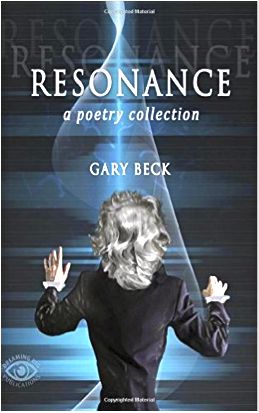Gary Beck, Resonance
reviewed by Alison McBain

Resonance Publisher: Dreaming Big Publications Date: February 23, 2016 Trade Paperback: 136 pages ISBN: 1523916400; 9781523916405 Price: $8.00 |
I am a poet as well as a fiction writer, but I must admit I am a little bit lazy when it comes to searching out new poets on my own. I mostly rely on recommendations from friends (and on my friends themselves, some of whom are amazing poets!). So it was with great pleasure that I picked up Gary Beck’s new collection of poetry, titled Resonance. I’m always pleased to be introduced to a new talent, and Mr. Beck certainly delivers.
Although the poems don’t seem to be in any particular order according to theme, there are several over-arching ideas that are tackled in Mr. Beck’s collection. They are, in no particular order: warfare/anti-war, women/love/lust, society, the natural world, and poetic writing itself. Mr. Beck’s style was flexible, with styles ranging from free verse to rhymed verse to prose poetry, although most of his poems are free verse.
There are times when Mr. Beck’s work reminded me of the works of my favorite poets, such as Langston Hughes’ song-style poetry (example: “Burnout”), Alan Ginsberg’s free-spinning words (example: “Possession”) or Mary Oliver’s nature poems.
Overall, the feel of the collection was dark. Although there were a few bright spots of humor, they were infrequent and didn’t overwhelm the generally somber mood of the collection. The overwhelming impression I received from the anthology was anger and loss.
Whereas such emotions can be turned towards an optimistic outlook, such as the works of Maya Angelou and Langston Hughes railing against racism and looking for a better societal outcome, I feel that Mr. Beck’s anger was direct and focused; he had a message to deliver, and the poems reflect his emotional delivery. I’m not one to discard negative poetry, but I would advise someone looking for Shel Silverstein, for example, to look elsewhere.
Now, here’s my favorite part, where I get to share with you some of the beautiful and unique imagery from Mr. Beck’s collection, the lines which really took my breath away. Here are a few of my favorites:
Children of Deprivation
we sit in comfort in our homes
newspapered, tv’d, dreamy,
careless of our sentinels, foes.
And our hungry children,
hollow from the cornucopia of science...
Mr. Beck’s poem “Possession” was one of those that reminded me of another poet, Alan Ginsberg, in its use of a free-wheeling style and lists of disparate, yet connected, imagery:
...works of beauty wisdom joy wild hearty lusty
obscene reverent ecstatic maudlin curious
erotic mad exuberance and find
imprisoned by my depth of learning feeling searching,
the memory of your too brief possession
paints your face upon a plaster-peeling ceiling,
splays your thighs across a molting rug
preens your breasts upon a eunuch bed,
amiable and insolent.
I’ll reference yet another of my favorite poets, Langston Hughes, in examining the excerpt from the next of Mr. Beck’s poems, “The Song of Squalor”:
Sing. Sing. In many tongues,
a thousand ended dreams
forgotten, then remembered
in the chastity of peace.
And Mr. Beck makes no apologies for his political beliefs (or sense of humor) in “Rant”:
Death to tyrants,
man the barricades,
come my people
long oppressed and pillaged,
turn labor’s hands to weapons.
Let the eaters of your flesh
hear your wrath and tremble.
You are might, good people,
so seize what is yours by right
and let the...
Wow, look at those legs....
Why am I standing here ranting?
Hey, baby...
As I said above, the theme of this collection is often melancholy and angry, but these emotions are cloaked in a beauty that is often hard to capture. From “Severance”:
...fall upon each other’s flesh,
roll until we die in cinders,
then wipe the dripping remnants
on a torn and grimy towel,
face each other from afar,
remote as distant stars
that witness fading love,
light two cigarettes
and dream alone.
And, among the darker themes, was a reoccurring angst about the inner city and social change. From “Abandoned Youth”:
They pour from isolation,
cry for all that’s missed,
curse only from despair,
then pick up the rusted pieces
of their tormented lives.
Only insomniacs see them run
in skinny-legged groups,
down filthy, barren streets,
past tenements of dank dirt
that fill the haunted dreams of youth.
I really enjoyed Mr. Beck’s turn of phrase and ability to explore the darkest of ideas with a grace that surpassed the ideas themselves. As I said, there were a number of poems that captured emotion in its many forms, and some of those poems captured the anger of a failed relationship, which painted the narrator’s lover in stark and unflattering terms.
Some of these didn’t resonate well with me, as the terms employed are negative towards relationships and, sometimes, women in general. This is my own personal taste, however, and I’m sure that readers will find much to recommend Mr. Beck’s poetry to a coveted place on their bookshelves. I feel that the collection contains a powerful message, and Mr. Beck is a talent not to be ignored. I enjoyed reading Resonance, and I hope you will, too.
Copyright © 2016 by Alison McBain

